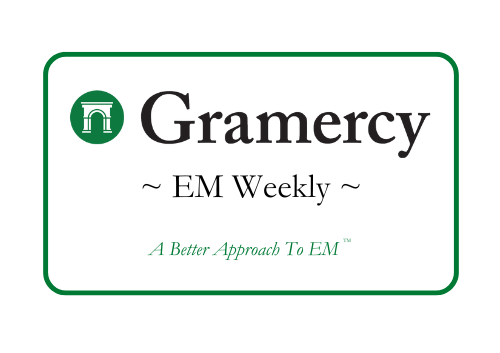Contents
Market Overview
Macro Update
This week saw a series of important geopolitical developments despite a short week for U.S. markets given the Presidents’ Day holiday on Monday.
The events included a meeting in Saudi Arabia between U.S. Secretary of State Marco Rubio and Russian Foreign Minister Sergey Lavrov, with no Ukrainian or European representation, to discuss a potential settlement on Ukraine, and U.S. Vice President J.D. Vance’s controversial remarks on Europe at the Munich Security Conference. In addition, a public spat erupted on social media between U.S. President Donald Trump and Ukraine President Volodymyr Zelenskiy, after Ukraine rejected President Trump’s request to transfer 50% of Ukraine’s mineral wealth rights to the U.S. as compensation for military and financial support provided by the Biden Administration.
Despite these events, negotiations on Ukraine are ongoing, with further headlines Friday that the critical minerals deal could be signed ‘in the very short-term.
In terms of global economic data this week, minutes from the FOMC’s January meeting revealed that most Fed policymakers saw “balanced” risks to the dual mandate of maximum employment and stable prices but remain vigilant to policy risks coming from the new Trump Administration. They signalled a preference for pausing the rate cutting cycle pending further developments. The U.S. preliminary composite PMI for February came in notably softer than expected at 50.4 vs. 53, while the final University of Michigan Sentiment Survey for February showed a decline in consumer sentiment (64.7 vs. 67.8 in January). Amid weaker-than-expected activity and higher inflation expectations, U.S. stocks trended lower at the close of the week, with the S&P 500 down 0.54%. The 10-year U.S. Treasury note, which widened at the beginning of the week, reversed course to end the week largely unchanged at 4.45%.
In the UK, year-over-year and month-over-month CPI came in higher than expected at 3.0% vs. 2.8% and -0.1% vs. -0.3%, respectively. Meanwhile, the flash composite PMI continued to signal a lower growth/higher inflation environment, which will likely result in a more cautious approach from the BoE on policy easing.
In the Eurozone, French CPI was also hotter than markets expected at 1.7% year-over-year vs.1.4% and 0.2% month-over-month vs. -0.1%. The composite February flash PMI also underperformed at 44.5 vs. 48 and dropped further into contractionary territory from 47.6 in January. The German flash PMI fared better at 51, outperforming market expectations and accelerating from 50.5 last month.
In Asia, China kept loan prime rates unchanged at 3.6% (5y) and 3.1% (1y). In India, the preliminary composite PMI jumped to a robust 60.6 in February, from 57.7 in January. In Japan, national CPI year-over-year accelerated to 4.0% in January, from 3.6% in December. The composite PMI improved to 51.6, into expansionary territory.
In global macro markets, the EURUSD finished the week at ~1.05, drifting away from parity, while DXY was also slightly lower below 107, after having flirted with 110 earlier in the year. Oil prices (Brent) finished the week in the mid-70s, remaining within the recent 74-77 $/barrel range. Gold continued to rally, gaining 1.8% on the week.
EM Credit Update
Emerging market sovereign credit cash bonds delivered marginally negative returns, ending the week down 0.29%, with high yield underperforming investment grade (-0.42% vs. -0.14%). Spreads were 4bps wider, driven by high yield which was wider by 8bps. Emerging market corporate credit bonds were more resilient, delivering a total return of +0.09% this week, with investment grade bonds (flat) underperforming high yield bonds (+0.17%). Spreads were marginally tighter for corporates (-0.6bps). EM local currency bonds ended the week 0.1% down, with a slightly weaker USD offsetting upside inflation surprises.
The distressed Lebanese USD bonds were again outperformers this week as market optimism about the new government remains strong.
Ukrainian USD bonds underperformed this week amid a flurry of conflicting news and social media posts around the trajectory of the Trump Administration’s relationship with Europe, Ukraine and Russia and implications for the potential end to the conflict.
The week was hectic on the new issue front, with Qatar, Uzbekistan, Brazil, Mongolia, Dominican Republic, and Slovakia issuing new sovereign bonds. In the corporate world, activity was also strong, with more than 20 deals across EM regions.
The Week Ahead
Next week, the most important geopolitical development, in addition to Ukraine/Russia headlines, will be the outcome of the German elections on Sunday. Markets will be focused on the nature and strength of the coalition that emerges.
Important global macro releases include U.S. 4Q24 annual GDP, with 2.3% year-over-year expected, U.S. initial jobless claims on Thursday, and the PCE price index on Friday, the Fed’s favorite inflation-pressures measure.
In France, preliminary CPI figures for February will be released, as will final 4Q24 GDP, with 0.7% year-over-year expected. Markets will see the same releases for Germany, with final 4Q24 NSA GDP expected to be -0.4% and preliminary year-over-year CPI for February expected to be 2.3%. PMIs are due in China and expected to remain close to the 50 expansion/contraction border.
There will be central bank decisions in Israel (expected hold at 4.50%), Hungary (hold at 6.50%), Thailand (hold at 2.25%) and Dominican Republic (hold at 5.75%).
Fixed Income

Equities
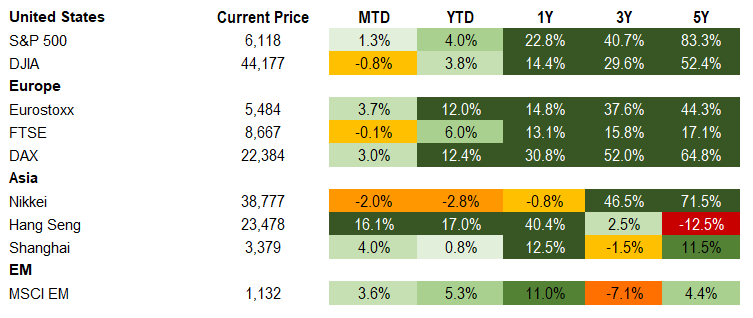
Commodities

Source for data tables: Bloomberg, JPMorgan, Gramercy. EM Fixed Income is represented by the following JPMorgan Indicies: EMBI Global, GBI-EM Global Diversified, CEMBI Broad Diversified and CEMBI Broad High Yield. DM Fixed Income is represented by the JPMorgan JULI Total Return Index and Domestic High Yield Index. Fixed Income, Equity and Commodity data is as of February 21, 2025 (mid-day).
Country Highlights
Rhetoric Intensifies in Negotiations Over Ukraine
Event: Following the 90-minute phone call between Presidents Trump and Putin on February 12th, a meeting between U.S. Secretary of State Rubio and Russian Foreign Minister Lavrov on a potential Ukraine agreement took place in Saudi Arabia without Ukrainian or European representation, raising concerns among the latter parties. The meeting was followed by remarks critical to Europe by U.S. Vice President Vance during the Munich Security Conference, which rattled the bloc’s leaders. Then a public spat took place on social media between U.S. President Trump and Ukraine President Zelenskiy, after Ukraine rejected Trump’s request to transfer 50% of Ukraine’s mineral wealth rights to the U.S. as compensation for military and financial support provided by the Biden Administration. Negotiations are ongoing, with further headlines Friday that the critical minerals deal could be signed ‘in the very short-term.’
Gramercy Comment: The events this week have placed European political leaders in a tough situation in which they need to reassess, and potentially increase, their level of support to Ukraine to remain relevant in both public and private negotiations with the Trump Administration. The significant shift in U.S. foreign policy away from Europe and the NATO alliance and in favor of Russia, as well as the harsh negotiating position by the Trump Administration, has surprised Europe.
In this context, we expect that most pro-Ukrainian European counties will double down on their efforts to support Kyiv militarily and financially in the coming weeks and months. The outcome of German elections this weekend and the strength of the new German Ggovernment’s mandate will likely determine the ability of this “coalition of the willing” to provide effective help to Ukraine amid the anticipated withdrawal of U.S. support.
South Africa Postpones 2025 Budget to March
Event: Finance Minister Enoch Godongwana delayed the budget presentation from February 19th to March 12th following a reported disagreement between governing coalition partners over a 2% VAT increase. South Africa bonds and FX were relatively resilient in the aftermath.
Gramercy Comment: The postponement of the budget is unusual, but short-term, and likely reflects political growing pains of the 10-party Government of National Unity (GNU) that was formed after last year’s general election. The pushback against the VAT hike came ahead of the G-20 meeting held in Johannesburg at the end of the week, which was boycotted by the U.S. over South Africa’s solidarity, equity, and sustainability agenda. We expect GNU partners to refocus their attention on the budget in the coming weeks and ultimately water down the proposed tax measures with a 2025/26 deficit target of around 4.5% of GDP.
Senegal Court Releases Long Awaited Review of Government Financial Audit
Event: Last week, the Court of Auditors released its review of the government’s financial audit. It revealed a higher-than-expected debt to GDP of 99.7% as of year-end 2023, which drove spreads wider. This week, the authorities held an investor call that reiterated the government’s commitment to remedying the country’s fiscal position, pursuing ongoing coordination with the World Bank and the IMF, and negotiating new programs with the Fund. The country’s Eurobonds partially retraced last week’s losses in the call’s aftermath.
Gramercy Comment: The longer audit process and higher-than-expected debt figures are a credit negative. However, we expect Senegal to receive a waiver from the IMF on the misreporting, given its commitment to remedial measures and fiscal consolidation, and begin to negotiate new funding from the IMF later this year. We would expect the IMF program negotiations to partially focus on the composition of the fiscal adjustment and subsidy reform efforts. On a positive note, Senegal real GDP growth is expected to be over 9% this year as hydrocarbon production comes online.
Emerging Markets Technicals
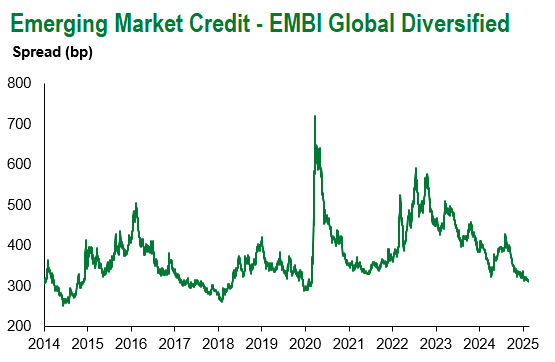
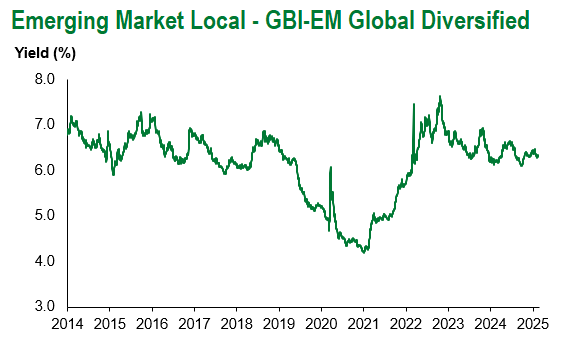
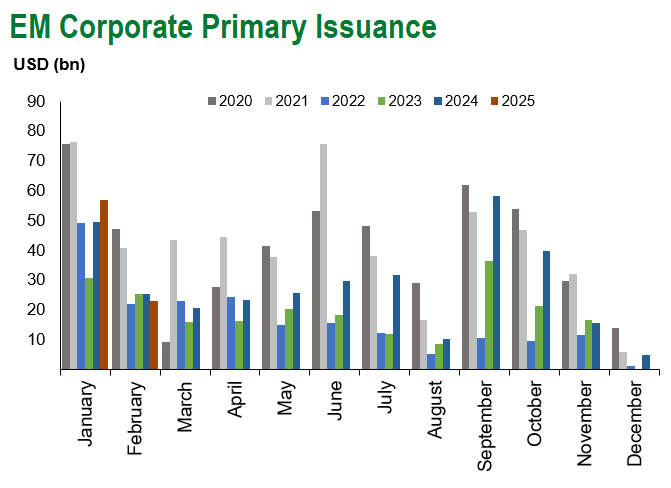

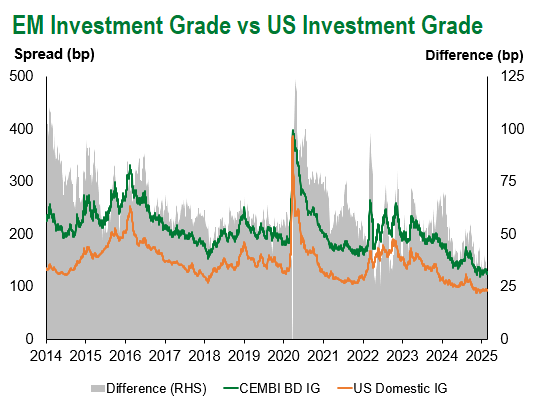



Emerging Markets Flows
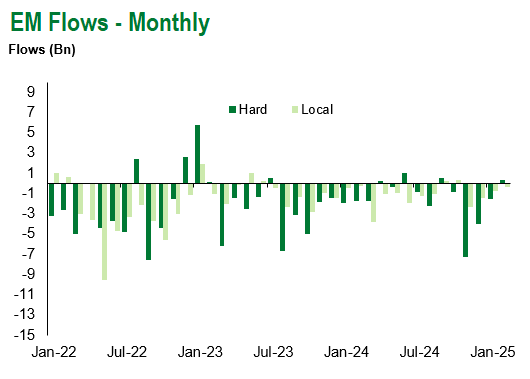

Source for graphs: Bloomberg, JPMorgan, Gramercy. As of February 21, 2025.
For questions, please contact:
Simon Quijano-Evans, Managing Director, Chief Strategist, [email protected]
Kathryn Exum, CFA ESG, Director, Co-Head of Sovereign Research, [email protected]
Petar Atanasov, Director, Co-Head of Sovereign Research, [email protected]
This document is for informational purposes only. The information presented is not intended to be relied upon as a forecast, research or investment advice, and is not a recommendation, offer or solicitation to buy or sell any securities or to adopt any investment strategy. Gramercy may have current investment positions in the securities or sovereigns mentioned above. The information and opinions contained in this paper are as of the date of initial publication, derived from proprietary and nonproprietary sources deemed by Gramercy to be reliable, are not necessarily all-inclusive and are not guaranteed as to accuracy. This paper may contain “forward-looking” information that is not purely historical in nature. Such information may include, among other things, projections and forecasts. There is no guarantee that any forecasts made will come to pass. Reliance upon information in this paper is at the sole discretion of the reader. You should not rely on this presentation as the basis upon which to make an investment decision. Investment involves risk. There can be no assurance that investment objectives will be achieved. Investors must be prepared to bear the risk of a total loss of their investment. These risks are often heightened for investments in emerging/developing markets or smaller capital markets. International investing involves risks, including risks related to foreign currency, limited liquidity, less government regulation, and the possibility of substantial volatility due to adverse political, economic or other developments. References to any indices are for informational and general comparative purposes only. The performance data of various indices mentioned in this update are updated and released on a periodic basis before finalization. The performance data of various indices presented herein was current as of the date of the presentation. Please refer to data returns of the separate indices if you desire additional or updated information. Indices are unmanaged, and their performance results do not reflect the impact of fees, expenses, or taxes that may be incurred through an investment with Gramercy. Returns for indices assume dividend reinvestment. An investment cannot be made directly in an index. Accordingly, comparing results shown to those of such indices may be of limited use. The information provided herein is neither tax nor legal advice. Investors should speak to their tax professional for specific information regarding their tax situation.
